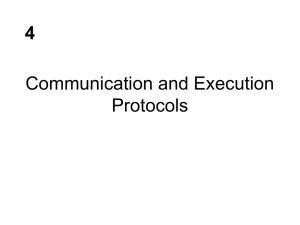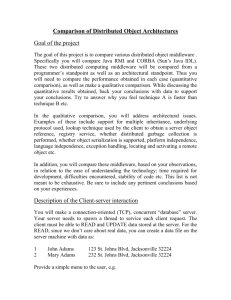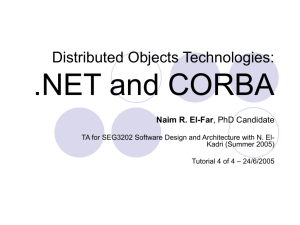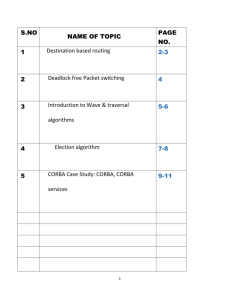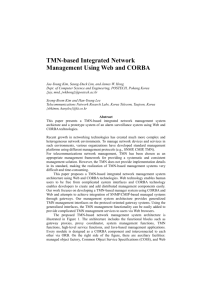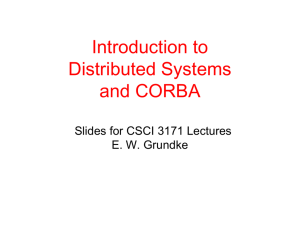CS603 Distributed Object Systems
advertisement
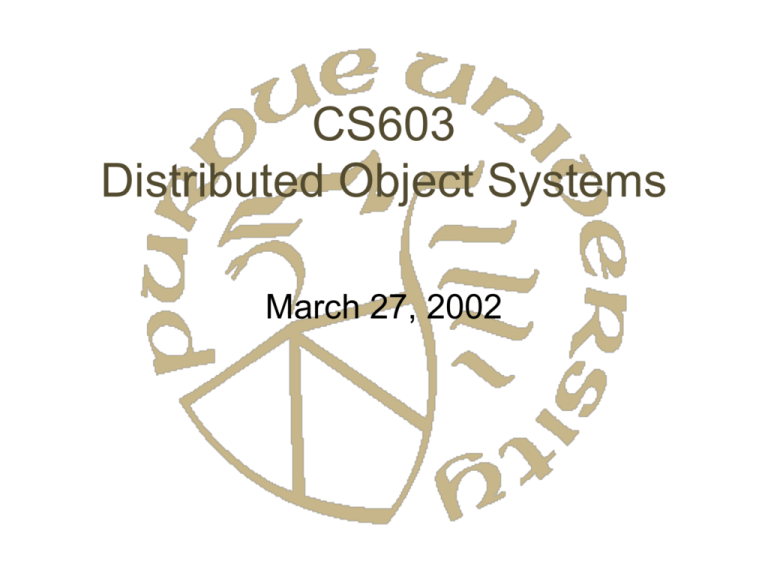
CS603
Distributed Object Systems
March 27, 2002
Distributed Object Systems
• What are they?
– CORBA
– DCOM
– Java/RMI
• But what does it mean?
– RPC for the object crowd
– With all the tradeoffs/choices/distinctions of
RPC systems
Distributed Objects as RPC++
• Interface Description Language
– Defines external view of objects
• Compilers / Precompilers
– Language extensions
• Run Time System
– Directory Services
– Data Conversion
– Security / Authentication
Distributed Object System:
Distinctions
• Single language vs. multilingual
– Cross-lingual?
• Platform independence
– True cross-platform communication?
• “Extras”
– Real-time features
– Fault tolerance
– Transaction support
–…
The Big Three
• CORBA – DCE on steroids
– Cross-lingual (primarily C++, Java)
– Cross-platform
– Many features
• DCOM – Microsoft’s answer
– Some cross-lingual support (within Microsoft world)
– Windows only
– Built on DCE RPC and COM
• Java RMI
– Single language, tightly integrated
CORBA: Background
• Object Management Group
– Corporate-sponsored standards body
– Members develop and vote on standards
– Current specs include UML, CORBA
• Started April 1989
• Working groups for extensible specifications
–
–
–
–
RealTime CORBA
Fault-Tolerant CORBA
Embedded CORBA
Many more…
CORBA: Basics
(Thanks to Doug Schmidt, Andrew Tannenbaum, and OMG for figures)
• Object Request Broker
• Object Services
– Naming, “Trading” (property-based location), security, etc.
• Common Facilities
– General interfaces, e.g., OpenDoc
– Domain interfaces: Standards
– Application interfaces: IDL specifications for a particular application
ORB Architecture
CORBA IDL
• Syntactic description of objects
• Single Interface Definition Language
– Compiles to multiple binary interfaces:
C, C++, Java, Smalltalk, Ada, COBOL, ?
• Assign Repository Identifier
– Register interface in interface repository
• Generate Proxy
– Client-side stub
– Marshals invocation request
– Unmarshals result
• Also Dynamic Invocation Interface
– Invoke object when interface not known until runtime
Key ORB facilities
• Manipulate object references
– Marshal/Unmarshal
– Comparison
• Service Discovery
– By name
– By property
– Interface repository and Implementation repository
• ORB/Proxy interface can be vendor specific
Interfaces
Invocation Models
• Default: Synchronous Semantics
– Block for response
– Exception on failure
– At-most-once semantics
• One-Way Request
– No response needed/possible
– Non-blocking
– Best effort semantics
• Deferred Synchronous
– Caller can continue and later wait for result
Naming
• Object reference
– Language independent “pointer”
– POA: Adaptor to make server-side code accessible
to client
Indirect Binding
Message passing models
• Events
– No guarantees
– No persistence
• Notification
– Events with filtering
Persistent Communications
• Callback model
– Client provides object that
is called with result
• Polling Model
– Client polls for results
• Messages Stored by
ORB
Processes
• Client and Server distinct
– Client processes are simple
– Server potentially complex
• Agent processes
– Interface to external agent system
Common Services
• Collection service
– List/queue/etc. objects
• Iterator, get methods
– “Class library” for CORBA
• Query service
– Construct collections searchable through declarative
query language
• Concurrency control service
– Locking mechanisms
• Transaction service
Services – The Full List
•
•
•
•
•
•
•
•
•
•
•
•
•
•
•
•
Collection
Query
Concurrency
Transaction
Event
Notification
Externalization
Life cycle
Licensing
Naming
Property
Trading
Persistence
Relationship
Security
Time
Grouping objects into lists, queue, sets, etc.
Querying collections of objects in a declarative manner
Allow concurrent access to shared objects
Flat and nested transactions on method calls over multiple objects
Asynchronous communication through events
Event-based asynchronous communication
Marshaling and unmarshaling of objects
Creation, deletion, copying, and moving of objects
Attaching a license to an object
Systemwide naming of objects
Associating (attribute, value) pairs with objects
Publish and find the services an object has to offer
Persistently storing objects
Expressing relationships between objects
Secure channels, authorization, and auditing
Current time within specified error margins
Interoperability
• Multiple ORB vendors
– Do you have to choose one?
• General Inter-ORB Protocol
– Framework – without tranport
– Internet Inter-ORB Protocol on TCP
• Message Types:
– From client: Request, LocateRequest,
CancelRequest
– From server: Reply, LocateReply
– Both: CloseConnection, MessageError, Fragment
CS603
CORBA
March 29, 2002
CORBA Programming
1. Select and install an Object Request Broker
– More later – examples based on ORBIX, C++
2. Define the interfaces (IDL)
3. Create classes that implement interfaces
4. Write server function
– Instantiates classes
– Registers with ORB
5. Run Server
6. Write and Run Client
Ticket Office:
IDL
// IDL – file ticket.idl
typedef float Price;
struct Place {
char row;
unsigned long seat;
};
Interface TicketOffice {
readonly attribute string name
readonly attribute unsigned long numberOfSeats
Price getPrice (in Place chosenPlace);
boolean bookSingleSeat (in Place chosenPlace, in string
creditCard);
};
Ticket Office:
Compile IDL
% idl –B –S ticket.idl // Produces several files:
• ticket.hh – C++ headers
#include <CORBA.h>
Typedef CORBA::Float Price;
Struct Place { CORBA::Char row; CORBA::ULong seat; };
Class TicketOffice: public virtual CORBA::Object { public:
Virtual char* name() throw (CORBA::SystemException);
…
Class TicketOfficeBOAImpl { … };
• ticketC.C // stubs for clients
• ticketS.C // skeleton for server
• TicketOffice_i.h, .C
// Outline of implementation
TicketOffice:
Implementation Declaration
class TicketOffice_i : public virtual TicketOfficeBOAImpl {
char* m_name;
Price m-highPrice; Price m-lowPrice;
unsigned char** m_avail = {{1 1 1} {1 1 1} {1 1 1}};
public:
TicketOffice_i (const char * theName, const Price theHighPrice, const
Price theLowPrice);
virtual ~TicketOffice_i();
virtual char* name() throw (CORBA::SystemException);
virtual CORBA::ULong numberOfSeats()
throw (CORBA::SystemException);
virtual Price getPrice (const Place& chosenPlace)
throw (CORBA::SystemException);
virtual CORBA::Boolean bookSingleSeat (const Place& chosenPlace,
const char* creditCard) throw (CORBA::SystemException);
};
TicketOffice:
Implementation
#include “ticket_i.h”
TicketOffice_i::TicketOffice_i (const char *
theName, const Price theHighPrice,
const Price theLowPrice) :
m_highPrice(theHighPrice),
m_lowPrice (theLowPrice) {
m_name = new char[strlen(theName) + 1];
strcpy(m_name, theName); }
TicketOffice_i::~TicketOffice_i() {
delete[] m_name; }
char* TicketOffice_i::name() throw
(CORBA::SystemException) {
return CORBA::string_dup(m_name); }
CORBA::ULong
TicketOffice::numberOfSeats() throw
(CORBA::SystemException) {
return 9; }
Price TicketOffice::getPrice (const Place&
chosenPlace) throw
(CORBA::SystemException) {
if (chosePlace.row == 1) return
m_lowPrice;
else return m_high_price; }
CORBA::Boolean
TicketOffice::bookSingleSeat (
const Place& chosenPlace,
const char* creditCard)
throw (CORBA::SystemException) {
unsigned long rowIndex =
chosenPlace.row – ‘A’;
if (m_avail[rowIndex][chosePlace.seat]) {
m_avail[rowIndex][chosePlace.seat] = 0;
return 1; }
else return 0; }
TicketOffice:
Server
#include “ticket_i.h”
int main() {
TicketOffice_i myTicketOffice(
“Loeb”, 15.00, 10.00);
CORBA::Orbix.impl_is_read(“TicketOfficeSrv”);
}
• Following registers server so it is
automatically started (or just run a.out)
% putit TicketOfficeSrv a.out
TicketOffice:
Client
#include “Ticket.hh”
int main() {
TicketOffice_var toVar;
tovar = TicketOffice::_bind(“:TicketOfficeSrv”);
Place p = {‘B’, 1};
if (toVar->bookSingleSeat(p, “1234 5678”))
cout << “Seat B1 booked at ” << toVar->name() <<
“ for $” <<toVar->getPrice(p);
else
cout << “Seat B1 taken”;
}
CS603
CORBA
April 1, 2002
More on Registering a Server
• Registration – generic (not Orbix-specific)
CORBA::ORB_ptr orb =
“CORBA::ORB_init(argc, argv, “Orbix”);
CORBA::BOA_ptr boa = orb->BOA_init (argc,
argv, “Orbix_BOA);
boa->impl_is_ready(“TicketOfficeSrv”);
• impl_is_ready defaults to waiting forever
– impl_is_ready(name, ORBA::ULong timeOut);
// return if idle for timeOut
Wrapping Existing Code
• TIE approach
– Creates object that interfaces CORBA to
identically declared existing C++ classes
– Execute DEF_TIE macros to create/bind
• Multiple inheritance approach
– CORBA interface implementation inherits
• BOAImpl
• Legacy class
Finding operations:
Simple Binding
• Simple
• Optionally specify host
• Can specify additional information: Marker
– Server
myTicketOffice._marker(“Loeb”);
myTicketOffice._bind(“TicketOffice”);
– Client
to_var p =
to::_bind(“Loeb:TicketOffice”, “blitz”);
Finding Operations:
Naming Service
• Database of bindings: name X object ref
• Naming context: Hierarchical structure
• A name is a sequence
– typedef sequnce<NameComponent> Name;
– Struct NameComponent
• id – real name
• kind – application-specific information
Finding Operations:
Naming Service
• NamingContext interface
– Object resolve(in Name n) – get object given name
raises ( NotFound, CannotProceed, InvalidName );
– Void bind(in Name n, in Object o) … -- bind object to name
– Void bind_context(in Name n, in NamingContext nc) … – put
name in context
• CosNaming interface
– Struct Binding { Name binding_name; {nobject, ncontext}
binding_type };
– Typedef sequence<Binding> BindingList;
– Interface NamingContext {
void list (in unsigned long how_many, out BindingList bl, out
BindingIterator bi); };
Naming: Use
• Create hierarchy of naming contexts
– E.g., tourism: theatre, hotel, …
• Bind specific name to context
– tourism.theatre.loeb
• Resolution: Create name and resolve
–
–
–
–
–
name = new CosNaming::Name(3);
name->length(3);
name[0].id = CORBA::string_dup(“tourism”);
name[0].kind = CORBA::string_dup(“”);
name[1].id = …
• LoebTicketOffices = namecontext->resolve(name);
– Also facilities to iterate over or select from multiple results
More on IDL
• IDL supports inheritance, multiple inheritance
– Implementations must do the same
– Can redefine operations at implementation level
• Can forward reference / recursive types
interface a;
interface b { readonly attribute a a_inst };
interface a { … };
• #include, #define, etc. supported
Object References
• Can pass objects
• Given class foo, get class foo_ptr (C++ pointer)
– Must manually maintain reference counts
• foo_ptr p2 = p1;
p2 = foo::_duplicate(p1);
• CORBA::release(p2);
– Class foo_var: Automatically maintains reference
counts
– Use _ptr for parameters
• Passing objects: Server understands them
– Parameters defined in IDL
– Server must have valid implementation (including
parameters) to invoke them
Casting
• Can assign object reference to object
reference of parent class
– Can’t use _var for target and _ptr for source
• Can Narrow: Assign object to child
– child = child_class::_narrow(parent)
Dynamic Invocation
(following syntax ORBIX-specific)
• Create an “on-the fly” reference
CORBA::Object_ptr target = // any object
CORBA::Request r(target, “operation”)
r << CORBA::inMode << inparameter <<
CORBA::outMode << outparameter …;
r.invoke();
• Can use repository to identify name/parameters
to construct request
• Only way to make deferred synchronous calls
– r.send_deferred(), r.poll_response(), r.get_response()
– Also r.send_oneway()
Dynamic Skeleton Interface
• Server equivalent of DII
– Not required to use DII
• Intended for gateways
– Server doesn’t understand calls it can process
– Trusts client/server to generate legal calls
– Translates to legacy server protocol
Security
• Policy Objects
– Specify requirements
• Secure messaging
• Authentication / signing
• Trusted host list
• Security services
– Know how to implement policy objects

